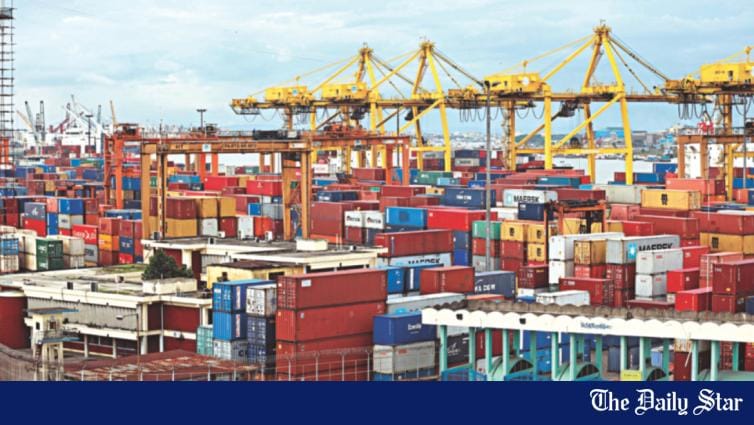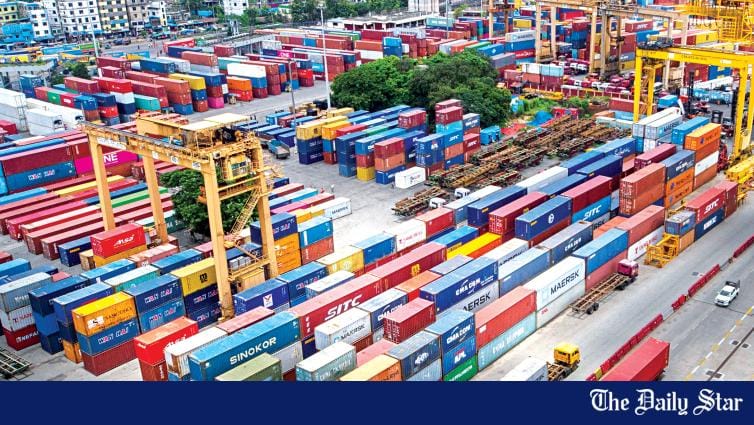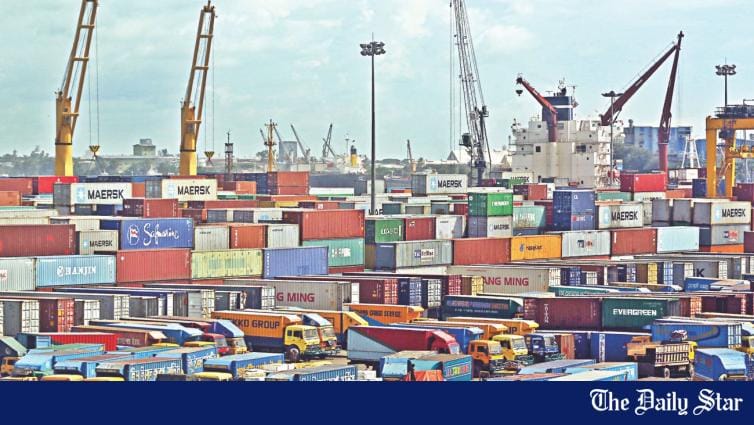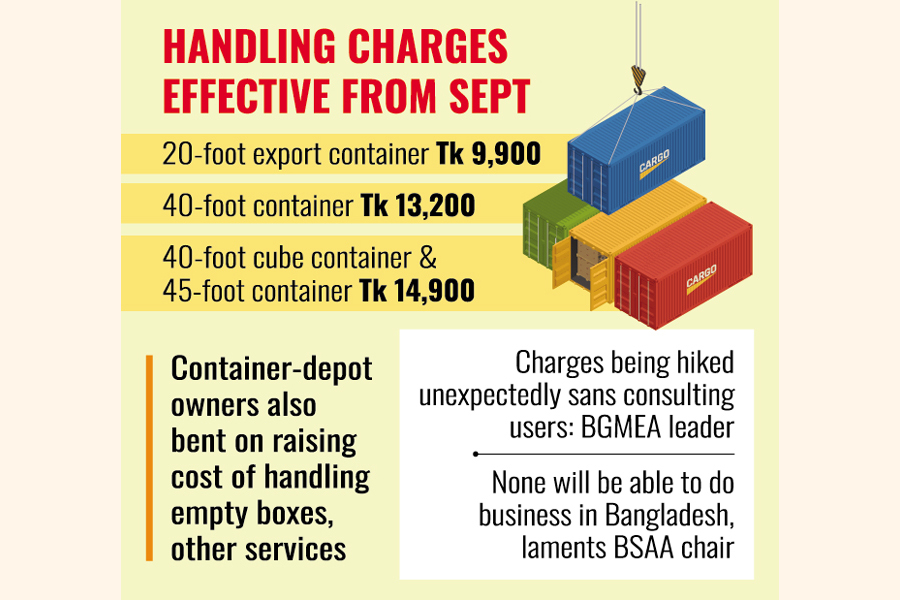Saif
Senior Member
- Messages
- 14,832
- Reaction score
- 7,674
- Origin

- Residence

- Axis Group

- Copy to clipboard
- Thread starter
- #121

Govt not giving port to anyone rather wants to renovate it: Shafiqul
Chief Adviser’s Press Secretary Shafiqul Alam today said the government is not giving Chattogram Port to anyone rather it wants to renovate it. “The government wanted that the world's biggest companies can manage the Chattogram Port. We are not giving the port to anyone. We want them (
Govt not giving port to anyone rather wants to renovate it: Shafiqul
Published :
May 25, 2025 22:20
Updated :
May 25, 2025 23:57

Chief Adviser’s Press Secretary Shafiqul Alam today said the government is not giving Chattogram Port to anyone rather it wants to renovate it.
“The government wanted that the world's biggest companies can manage the Chattogram Port. We are not giving the port to anyone. We want them (foreign companies) to invest in the terminal and manage it. We have already received assurances from foreign investors that they will invest $3 billion,” he told an event of the Capital Market Journalists Forum (CMJF) at its office in Paltan in the capital, BSS reports.
Shafiqul said: “In a country like Bangladesh we are talking about one port and a few terminals. Many countries have 20-30 such port terminals. So we have to strengthen it. That is the challenge.”
He said the interim government is working for reforms, judicial processes and elections as economic reforms are underway.
After the reforms, the economic situation will improve, he hoped.
“We are trying to create a broader economic platform where our Bangladeshi economy takes off. If the growth of the economy takes off, then its impact will be felt on the stock market. If the overall economic situation is very good, it is expected that the Bangladeshi stock market will rise to a new height very quickly,” he said.
About the national elections, the press secretary said national elections will be held by June 30 next year.
Turning to capital market, he said it has become a den of robbers as small investors here have only been victims of fraud and lost their capital.
Those who took responsibility for the reform of the capital market in the past, they always served interests of a group, he said.
Referring to the meeting of the Chief Adviser Prof Dr Muhammad Yunus on the capital market, he said, for this reason, the chief adviser has given importance to bringing in foreign experts who know how to globally reform the share market and bring it to global standards.
“A three-month timeline has been given for this. They will come within three months and tell us what is needed to do in the share market and accordingly, action will be taken very quickly,” he said.
As a result, the capital market of Bangladesh will not be held hostage by any group, Shafiqul Alam said.
Stating that the banking sector is being pulled out of the hole, the press secretary said, "Our banking system was very weak. Everything was in a state of ruin. From there, we are trying to pull the banking system out of a hole and raise it to the mountain."
He said, "The currency has been floated for two weeks. But the currency has not depreciated. This indicates that the reforms are giving a good signal."
Stating that increasing foreign investment will have a positive impact on the capital market, Shafiqul Alam said, "If we can get foreign investment right, bring it in a lot, and the macro economy is fine, then we think it will have an impact on the capital market. The capital market is bound to grow well."
He said, "Another issue is to reduce inflation. This was a huge challenge for us. We have increased interest rates, now it is probably more than 10 percent, after doing that, we see that inflation has started to decrease. Our hope, which our central bank governor has said, is to bring inflation down to 5 percent by the end of this year."
He said, "Foreign investment has started coming. In June, you will see that about 150 Chinese investors are coming to Bangladesh, led by a commerce minister. If the Chinese come to Bangladesh, the job growth that we want will be very fast."
Stating that dividing the NBR into two was the government's priority, he said, "Our tax collection was always low. This is because we gave a lot of tax exemptions and the tax collection system was very inefficient. The government has given a lot of focus on this area. In that light, the NBR has been divided into two. As a result of this, we think that tax collection will increase."
CMJF President Golam Samdani Bhuiyan presided over the program, which was moderated by General Secretary Abu Ali.
Published :
May 25, 2025 22:20
Updated :
May 25, 2025 23:57
Chief Adviser’s Press Secretary Shafiqul Alam today said the government is not giving Chattogram Port to anyone rather it wants to renovate it.
“The government wanted that the world's biggest companies can manage the Chattogram Port. We are not giving the port to anyone. We want them (foreign companies) to invest in the terminal and manage it. We have already received assurances from foreign investors that they will invest $3 billion,” he told an event of the Capital Market Journalists Forum (CMJF) at its office in Paltan in the capital, BSS reports.
Shafiqul said: “In a country like Bangladesh we are talking about one port and a few terminals. Many countries have 20-30 such port terminals. So we have to strengthen it. That is the challenge.”
He said the interim government is working for reforms, judicial processes and elections as economic reforms are underway.
After the reforms, the economic situation will improve, he hoped.
“We are trying to create a broader economic platform where our Bangladeshi economy takes off. If the growth of the economy takes off, then its impact will be felt on the stock market. If the overall economic situation is very good, it is expected that the Bangladeshi stock market will rise to a new height very quickly,” he said.
About the national elections, the press secretary said national elections will be held by June 30 next year.
Turning to capital market, he said it has become a den of robbers as small investors here have only been victims of fraud and lost their capital.
Those who took responsibility for the reform of the capital market in the past, they always served interests of a group, he said.
Referring to the meeting of the Chief Adviser Prof Dr Muhammad Yunus on the capital market, he said, for this reason, the chief adviser has given importance to bringing in foreign experts who know how to globally reform the share market and bring it to global standards.
“A three-month timeline has been given for this. They will come within three months and tell us what is needed to do in the share market and accordingly, action will be taken very quickly,” he said.
As a result, the capital market of Bangladesh will not be held hostage by any group, Shafiqul Alam said.
Stating that the banking sector is being pulled out of the hole, the press secretary said, "Our banking system was very weak. Everything was in a state of ruin. From there, we are trying to pull the banking system out of a hole and raise it to the mountain."
He said, "The currency has been floated for two weeks. But the currency has not depreciated. This indicates that the reforms are giving a good signal."
Stating that increasing foreign investment will have a positive impact on the capital market, Shafiqul Alam said, "If we can get foreign investment right, bring it in a lot, and the macro economy is fine, then we think it will have an impact on the capital market. The capital market is bound to grow well."
He said, "Another issue is to reduce inflation. This was a huge challenge for us. We have increased interest rates, now it is probably more than 10 percent, after doing that, we see that inflation has started to decrease. Our hope, which our central bank governor has said, is to bring inflation down to 5 percent by the end of this year."
He said, "Foreign investment has started coming. In June, you will see that about 150 Chinese investors are coming to Bangladesh, led by a commerce minister. If the Chinese come to Bangladesh, the job growth that we want will be very fast."
Stating that dividing the NBR into two was the government's priority, he said, "Our tax collection was always low. This is because we gave a lot of tax exemptions and the tax collection system was very inefficient. The government has given a lot of focus on this area. In that light, the NBR has been divided into two. As a result of this, we think that tax collection will increase."
CMJF President Golam Samdani Bhuiyan presided over the program, which was moderated by General Secretary Abu Ali.













